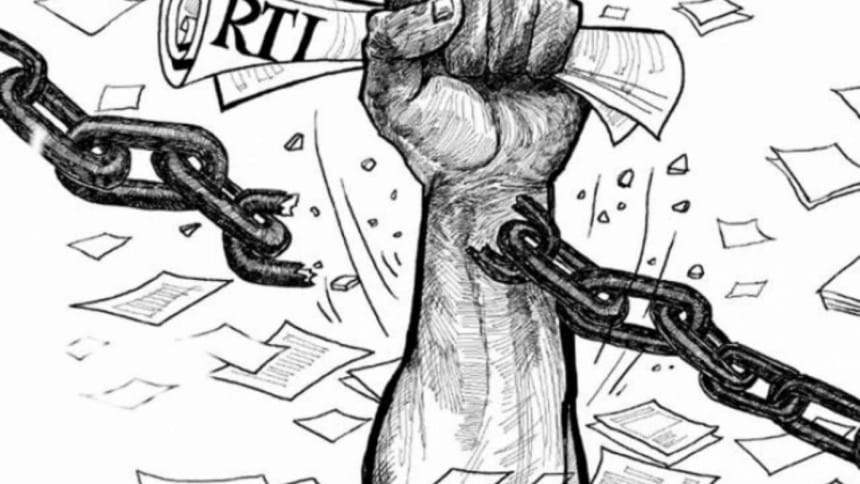Promoting “open government” through the RTI Act

We can easily forgive a child who is afraid of the dark; the real tragedy of life is when adults are afraid of the light." These famous words by Greek philosopher Plato perfectly describe the attitude of adults in Bangladesh towards the Right to Information Act (RTI).
Few of our fellow citizens realise that the RTI law has the power to change the age-old culture of official secrecy in the country and help establish transparent and accountable governance. RTI laws, enacted in over 110 countries of the world, are known as "sunshine laws" — to bring the secretive world of government work from darkness into sunlight.
The law enables citizens to access all information — with a few exceptions — held by public offices. Citizens may use the information so obtained to ensure their legitimate entitlements under the laws of the land. Or they may use it to find out if public offices abide by the laws, rules and regulations or indulge in unfair practices. It is not difficult to see how this can contribute to open government.
But to achieve this objective, the law must be used by citizens first. This is where problems of implementation arise.
Most of our citizens are accustomed to the culture of secrecy that shielded all government work from public view for centuries, and we are understandably reluctant to ask for information from public offices. In fact, many are afraid that the authorities concerned might even retaliate if the information they seek is considered sensitive. They also do not feel confident that the defence mechanism built into the system, via the Information Commission, will be able to protect them from uncooperative or irate officials. While some citizens have overcome this fear in more recent times, it is still a far cry from what is required for any systemic change.
In the face of such reticence, uptake of the law has been understandably slow. This column suggests alternative ways to deal with the situation to pave the way for further progress.
The main objective of the RTI Act can be encapsulated in two words: open government. Save a few sensitive areas, the law seeks to make most government information open to citizens, who may make RTI demands upon respective public offices, including those of some NGOs. By doing so, citizens, in effect, monitor the work of public servants.
Those who do not feel confident to ask for specific information could consider using other provisions of the law to advance its goals without the attendant fear. One of them is known as the "proactive disclosure" provision of the law. It requires public bodies to proactively disclose basic information about their work to the public at regular intervals. Unfortunately, progress here has been slow as most offices do not feel the compulsion to do so. Citizens can play a role to change this situation.
They could, for example, simply ask the offices concerned about the status of implementation of Section 6 of the RTI Act which contains the "proactive disclosure" provisions of the law [See www.rib-rtibangladesh.org for the text]. By doing so, citizens would alert the authorities concerned that they are being watched by the people — play sort of a "watchdog" role. If many citizens were to do this on a regular basis, the approach is likely to work. For, it is easier for the offices to abide by this general requirement of the law than respond to specific queries about their work.
Section 6 is entitled "publication of information". It requires every authority under the law "to publish and publicise all information pertaining to any decision they have taken, any proceeding or activity they have executed or proposed, by indexing them in such a manner as may easily be accessible to the citizens." It also states that in "publishing and publicising such information, no authority shall conceal any information or limit its easy access."
The disclosure requirements include the organisational structure, activities, responsibility of the officers and employees; description and process of decision-making; lists of all laws, acts, ordinance, rules, regulations, notifications, directives, manuals, etc., of the authority including the classification of all information lying with it. If the authorities published all these, there would be little need for citizens to resort to RTI demands in the first place.
The provisions further include that public authorities must disclose "all information pertaining to any decision they have taken" and "description and process of decision-making". They are also required to "explain the reasons and causes in support of such policies and decisions". This is indeed a big departure from the culture of secretive governance.
It is not difficult to imagine, therefore, the likely reaction of public authorities if citizens were to simply ask them about the status of implementation of the above provisions. They must either state that they are implementing them or, if they don't or disregard even to respond to such queries, face the tune at the complaint hearing before the Information Commission (IC), which is of a quasi-judicial nature.
If the IC plays its role well, it is more likely that the authorities would take the negligence more seriously. And if they respect the provisions of Section 6 fully, at least half the objectives of the RTI Act would be achieved without intervention by citizens.
Unfortunately, the work of the IC too has not been fully up to the mark in this regard. In close to the 2,000 RTI complaints it has dealt with since the law came into force, the IC has given very few decisions to impress upon the authorities the consequences of disregarding the law. Only a handful of noncompliant public officials have been penalised or chastised by the IC so far in accordance with the law. This has not only deprived the public exchequer of large sums of money but has also failed to promote respect for the law by public officials.
Another alternative of a similar nature for citizens to consider would be to ask each public authority for a copy of its "Citizen's Charter". Legal requirements in this regard are contained in regulation 13 of the RTI Regulations (Preservation and Management) 2010.
It requires each public authority to adopt a "Citizen's Charter" containing information on how it deals with information seekers under the RTI Act. It is supposed to include a description of measures the authority takes regarding: standard of services offered to applicants, transparency in the process, choices provided, courtesies shown, provision for complaints and ensuring equal treatment for all.
Apart from other authorities, citizens could ask the IC itself for its "Citizen's Charter" to learn how it deals with their applications or complaints. Regarding the provisions of Section 6 of the Act, a simple request to the IC could be to find out why it has used the penalty and other sanctions of the law so sparingly and not given reasons for many of its decisions, as required by the section. In fact, since the IC is the main torch-bearer of the RTI Act, its own implementation of the law should be exemplary for others to emulate. If it does so properly, the task of citizens would be minimised. They would feel less anxious of public officials and more forthcoming to make use of the law to promote "open government".
Shamsul Bari and Ruhi Naz are Chairman, Research Initiatives, Bangladesh (RIB) and Project Coordinator (RTI section), RIB, respectively.
E-mail: [email protected]

 For all latest news, follow The Daily Star's Google News channel.
For all latest news, follow The Daily Star's Google News channel. 








Comments